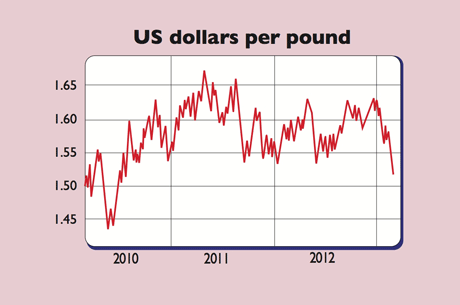
“What took you so long, Moody’s?” asks Joseph Cotterill on the Financial Times’s Alphaville blog. The credit-ratings agency, which, along with Standard & Poor’s and Fitch, is one of the major global firms in its field, has stripped Britain of its top-notch, triple-A credit rating.
Of the developed world’s major economies, now only two offer sovereign debt deemed triple-A by all three agencies. Sterling slid further on the news.
The decision was “neither surprising, nor informative, nor, in itself, damaging”, says Martin Wolf in the Financial Times. It has long been clear that the government’s fiscal consolidation plans have been blown off course by weak growth. Tax revenues have disappointed and public spending continues to spiral upwards, says Liam Halligan in The Sunday Telegraph.
Our debt pile grows ever bigger
Public borrowing in 2012-2013 is set to reach around £128bn, exceeding last year’s figure. With the annual deficit growing, we’re increasing the pace at which we are adding to our overall debt pile. By 2016, that will have reached £1.6trn, five times higher than in 2000. And even this forecast assumes that the austerity programme is fully implemented.
Moody’s is stating the obvious, then – and rather late in the day – when it notes that Britain’s failure to get on top of its debt makes it a worse credit risk. In any case, the ratings agencies disgraced themselves during the credit bubble by labelling lots of complicated subprime junk AAA, so their ability to move markets has diminished with their overall credibility.
As a result, this ratings downgrade, in itself, is hardly pivotal for investors. Politically, it’s a different story – if only because the government sets such store by it. The news will intensify the row over how to shake the economy out of its torpor.
Monetary policy is a mess too
Yet this downgrade comes at an awkward time. “Even as Britain’s fiscal policy heads towards the rocks, its central bank appears to have completely lost its bearings,” says Sam Fleming in The Times. The Bank says it is considering making its inflation remit more flexible, by which it means it will be more “openly tolerant of high inflation”, and it is also “divided and sending out confusing signals”.
Governor Mervyn King, once “one of the great apostles of inflation-targeting”, voted for more money printing this month, even as he predicted a recovery. All this is “toxic for market confidence”, says Fleming.
Investors seem increasingly worried about inflation eroding the value of British assets in future: bond prices reflect a jump in expected price rises over the next few years. Worryingly, “the UK is the only place where [inflation expectations] have shot up”, says David Milleker of Union Investment.
What next?
Meanwhile, concern over other problems, such as a break-up of the euro, the divided US government or a possible hard landing in China, have eased of late. So Britain no longer seems such a relative haven from trouble elsewhere.
If foreign investors lose faith in our assets, the latest slide in sterling “could easily turn into a full-blown rout”, says Jeremy Warner in The Daily Telegraph. That would stoke inflation, making investors even less inclined to hold British assets – especially bonds.
Soaring gilt yields means higher long-term interest rates, implying a fiscal crisis and another deep recession. Recent inflows into British bond markets have gone into reverse, note Alice Ross and Ralph Atkins in the FT. Investors’ patience is running out.